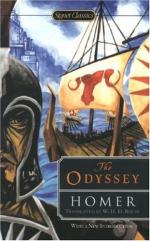In the preface to my translation of the “Iliad” I have given my views as to the main principles by which a translator should be guided, and need not repeat them here, beyond pointing out that the initial liberty of translating poetry into prose involves the continual taking of more or less liberty throughout the translation; for much that is right in poetry is wrong in prose, and the exigencies of readable prose are the first things to be considered in a prose translation. That the reader, however, may see how far I have departed from strict construe, I will print here Messrs. Butcher and Lang’s translation of the sixty lines or so of the “Odyssey.” Their translation runs:
Tell me, Muse, of that man, so ready at need, who wandered far and wide, after he had sacked the sacred citadel of Troy, and many were the men whose towns he saw and whose mind he learnt, yea, and many the woes he suffered in his heart on the deep, striving to win his own life and the return of his company. Nay, but even so he saved not his company, though he desired it sore. For through the blindness of their own hearts they perished, fools, who devoured the oxen of Helios Hyperion: but the god took from them their day of returning. Of these things, goddess, daughter of Zeus, whencesoever thou hast heard thereof, declare thou even unto us.
Now all the rest, as many as fled from sheer destruction, were at home, and had escaped both war and sea, but Odysseus only, craving for his wife and for his homeward path, the lady nymph Calypso held, that fair goddess, in her hollow caves, longing to have him for her lord. But when now the year had come in the courses of the seasons, wherein the gods had ordained that he should return home to Ithaca, not even there was he quit of labours, not even among his own; but all the gods had pity on him save Poseidon, who raged continually against godlike Odysseus, till he came to his own country. Howbeit Poseidon had now departed for the distant Ethiopians, the Ethiopians that are sundered in twain, the uttermost of men, abiding some where Hyperion sinks and some where he rises. There he looked to receive his hecatomb of bulls and rams, there he made merry sitting at the feast, but the other gods were gathered in the halls of Olympian Zeus. Then among them the father of men and gods began to speak, for he bethought him in his heart of noble Aegisthus, whom the son of Agamemnon, far-famed Orestes, slew. Thinking upon him he spake out among the Immortals:
’Lo you now, how vainly mortal men do blame the gods! For of us they say comes evil, whereas they even of themselves, through the blindness of their own hearts, have sorrows beyond that which is ordained. Even as of late Aegisthus, beyond that which was ordained, took to him the wedded wife of the son of Atreus, and killed her lord on his return, and that with sheer doom before his eyes, since we had warned him by the embassy of




